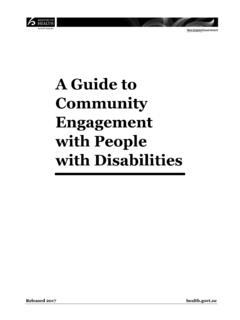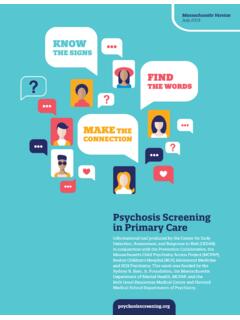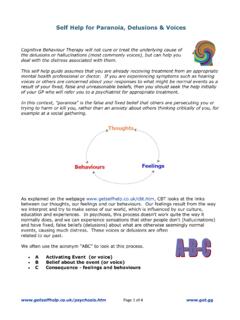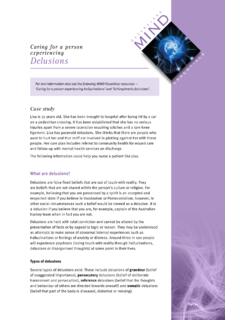Transcription of Screening Questions for Psychosis - Dr. Willer
1 Screening Questions for PsychosisTh e prevalence of some lifetime history of hallucinations and delusions in the general population is percent, although most of those reports were fl eeting visions or briefl y hearing the voice of a departed loved one (National Comorbidity Survey; R. C. Kessler, Berglund, Demler, Jin, & Walters, 2005). Th e prevalence of psychotic disorders (schizophrenia, schizophreniform disorder, schizoaff ective disorder, delusional disorder, and Psychosis not otherwise specifi ed) was found in a recent national survey to be percent (National Comorbidity Survey; R.)
2 C. Kessler et al., 2005), but that is almost certainly an underestimate since many individuals with Psychosis are not in a household setting ( , hospitalized, in a long-term institution, or in prison). Research that examined institutions as well as households fi nds twice the rate of psychotic disorders in the population (Goldner, Hsu, Waraich, & Somers, 2002). Th us, a reasonable guideline would be to expect about or at least a 1 percent prevalence of psychotic disorders in the for Psychosis is not easy because psychotic disorders are extremely heterogeneous.
3 To make a diagnosis of schizophrenia according to the Diagnostic and Statistical Manual of Mental Disorders (4th ed., text revision; American Psychiatric Association, 2000), the client must have two of these: hallucinations, delusions, disorganized speech, disorganized or catatonic behavior, and negative symptoms for 6 months. Hallucinations can occur in any sensory modality, and if you are being thorough, you will ask about each possible sense. Delusions are very heterogeneous as well, although there are six or so common categories of them.
4 Disorganized speech is generally diagnosed by observation, although if you haven t seen it before, it can be diffi cult to diagnose. Negative symptoms are diag-nosed by observation and asking about the client s daily functioning. In addition, clinically, I have found that some clients with psychotic symptoms to have mild thought disorder symptoms that may interfere with their cognition but are not obvious in their for Psychosis is recommended for every client but can be overly intrusive and time intensive when the client is high functioning and has a very low probability of Psychosis .
5 Th us, in practice, how does one balance these con-siderations? As a practical matter, research has shown that auditory hallucinations are by far the most common type of hallucination experienced by inpatients with schizophrenia or bipolar disorder (Baethge et al., 2005), with visual hallucinations coming in a distant second, and that persecutory delusions are the most common 11_ 111_ 17/29/2013 12:31:14 PM7/29/2013 12:31:14 PM2 Screening Questions FOR Psychosis delusions. Th is might suggest that observing the client for thought disorder, cou-pled with Screening for auditory and visual hallucinations and paranoia, might be suffi cient in a high-functioning population.
6 Alternatively, if you have screened for Psychosis in the written intake forms and the client s behavior shows no sign of Psychosis , it may be ok to skip asking about it in a high functioning popula-tion. In a lower-functioning population, a more thorough Screening should be is how the client typically experiences auditory hallucinations. Auditory hallucinations are oft en voices commenting on the client s behavior or thoughts. Th e voices might tell them what to do, although the client may not act on it.
7 Th e voices may talk almost all the time, or they may talk just occasionally. In milder cases, the client might hear what sounds like mumbling but cannot make out the words. Or the client might hear a voice calling her name when no one is present. Visual hallucinations are almost always visions of humans or humanlike beings. Usually visual hallucinations happen less frequently than auditory ones. Tactile hallucinations are oft en described as feelings of electricity or crawling on the skin.
8 Occasionally, a client may have a sensation within the body or under the skin that oft en accompanies a delusion of parasitic infestation. Olfactory hallucinations are extremely common. Usually, the client cannot articulate what the smell is but does state that it is unpleasant and realizes that others do not smell it. Gustatory or taste hallucinations are generally experienced as a bad taste. Sometimes these are accompanied by a delusion that the client is being poisoned. Here are Screening Questions for hallucinations in each sensory modality: Have you been hearing any voices?
9 Does it seem that other people are commenting on your behavior? Have you been seeing any visions? Have you been having any unusual feelings on your body or skin? Have you been experiencing any unpleasant smells that others don t notice? Have you been experiencing any unusual bad tastes lately that others don t notice?In addition, you may notice that the client is looking around the room for some-thing that is not there or seems distracted. In these cases, the client may be expe-riencing hallucinations during the interview and is responding or attending to are some Screening Questions for paranoid delusions and delusions of reference: Does it seem like people are talking about you?
10 Are people paying special attention to you? Do you feel that people are out to get you? Does it ever seem that the television or radio is talking specifi cally to you? Tell me about 211_ 27/29/2013 12:31:15 PM7/29/2013 12:31:15 PMSCREENING Questions FOR Psychosis 3 Here are some Questions for some other, less common delusions: Do you feel that you have any special abilities? What are those? Do you feel that you have some special importance? What is that? Have you ever felt that you could read people s minds or that they could read your mind?







